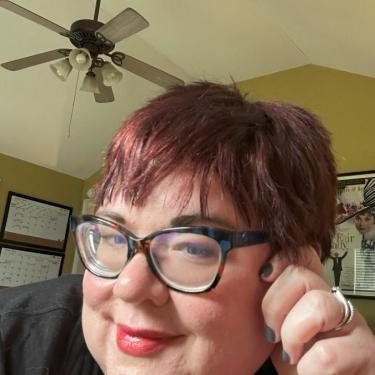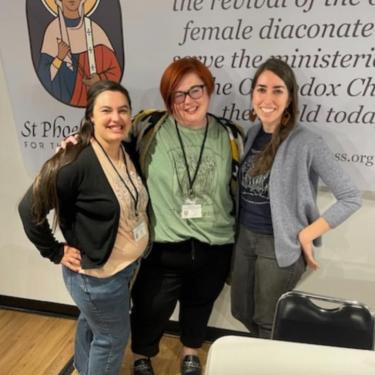
Kathryn McCord is our Woman of the Week, nominated for her work as the writer of the newsletter, The Orthodox Feminist. We asked her to tell you how she became a blogger on Orthodox themes and why she chose to take the stance of a feminist.
“I have always written. I wanted to be a writer from the time I was a kid. For years, I would write if there was something that really caught my attention in a homily or something: that’s how I think. In 2023, I finally decided that I wanted to start sharing what I was writing, because all I had been doing was reading my stuff to my husband, or maybe putting a caption on Instagram. But in 2023, I was feeling lonely. My asthma had gotten really bad and I was having a hard time being in church services because of the incense. I didn't feel that I knew where my place was in church anymore.
“When I was a Protestant, I had gone to seminary and planned to go into professional ministry. but I left all that to become Orthodox in 2012. By 2023, I felt like I had things to say. There seemed to be so much changing and I felt like I wasn't seeing anyone like me at church anymore. There were lots of families who had kids and were homeschooling. I don't have children and I work 9 to 5 out of the house. I honestly just felt like I had to start getting my thoughts out in the world. To figure out if I had a place in the church.
“When I did, it opened all these doors to meet and talk to other people. I stumbled across a St. Phoebe's event that November, and I saw how many more women were in the same place I was.
“I guess the rest is history. It has been an incredible experience to be able to put my words out there and have people be generous with their time and attention to read them, and even subscribe and pay me sometimes. It's becoming a community. We've done a couple of virtual events that have been small, but really rewarding. It's been nothing short of life-changing. In September it will be two years since I began writing The Orthodox Feminist.”
Axia!
“When I wrote my first post, I wanted people to know that it was OK to consider yourself a feminist and still be Orthodox. I grew up in the age of people saying things like, “well, I'm not a feminist but…” In the Protestant church world where I grew up, it was terrifying to think of yourself as a feminist. But I had come to feel that was an important part of my identity.
“When I looked at the gospels, when I looked at Christ's interactions with women, and at Saints in the early church, everything I learned and saw supported my feminist ideals of women as fully human and fully equal. I thought maybe, if one person just used this word and put “feminist” together with “Orthodox”, it could maybe pave the way for a different conversation.
I'm still exploring how to talk about Orthodox feminism in my writing. It's about more than a person's individual choice. Being an Orthodox feminist is about more than saying, “well, it's fine if somebody else wants to go out and work, I wanna stay home with my kids” or “it's fine if somebody wants to stay home with their kids, I wanna go out and work.” Orthodox feminism is about creating a culture in your church, or a system in society, that supports everybody, that supports families so that somebody can stay home if they want to, and so that individuals can find fulfillment and their own opportunities to minister to others, and kids can still be cared for. It's not enough to know I'm doing my feminist thing by going out into the world and working, or I'm still a feminist even though I stay at home, which you can definitely be. It's about understanding that it's a communal effort in support of everybody.
“Feminism was always about looking at things systemically rather than as an individual. It’s not about individual choice: it should be about community wholeness.
“I've had conversations multiple times recently with a couple of different women that are mothers, especially of young children. They'll say they consider themselves feminists, they have these ideals, but they feel like they're falling short in their individual lives. They're married to someone who is well-intentioned and lovely and believes in their equality and wants to work together for good. But they're still coming up against the constraints of breastfeeding or somebody has to go work and earn a living. It’s sad, because they're so lonely.
“I think of how often I have tried to offer something to my friends with kids. But for various reasons, the whole world is set up so that it's hard for me to help them and it's hard for them to receive help. Maybe the kid got sick and there's no one else to stay home with them. It’s nobody's fault but it's this way we're all conditioned that makes it hard to just share our lives with each other.
“To me, Orthodoxy and feminism are tied together. I've only become more feminist the longer I've become Orthodox. One of the things that drew me to Orthodoxy and that made it a healthy place for me to be was the sort of “eyes on your own plate” mentality. Just focus on working out your salvation. Nobody else's behavior really had any concern for me because it's not my behavior, it's theirs to work out. What I have to work out is how do I respond in grace and love and caring. And the longer I've tried to look at life that way, not in terms of what other people should do, but in how I should react or respond to what's happening around me, the more I keep seeing that Christ's example was always love.
“Feminism at its more communal origins, particularly like the second-wave feminism in the 60s and 70s - it wasn't perfect, but you had people reacting in these communal ways. Workplaces, for example, where they're providing childcare. Nobody's worried about why these women have children. Nobody's worried about why they need to bring their children to work. They're just seeing a need and meeting it. Feminism, at its core, can have this ethic of care for each other and for the community. I'm not saying men are this way and women are another way, but when the world is bifurcated into male spaces and female spaces, a lot gets left out. When women have more of a seat at the table and more input and how you set up and structure a society, you end up taking all of these other parts of life into account.”

As always, we asked our Woman of the Week, Kathryn McCord, to tell us about her morning routine:
“I know that we are not supposed to look at our phones first thing in the morning. But the Greek Archdiocese app has the daily prayers and all the daily readings in it, and it's the only way I've ever been consistent in morning prayer. I used to feel like I had to get up and pray in my icon corner or something, but my priest said something several months ago: he said that he did his morning prayers sitting down. He said, “Maybe God wants me to stand, but I want to lie down, so we compromise with me sitting down.” And I thought, that's fantastic. God wants me to pray. I don't want to get out of my bed and pray. I'm going to pray on my phone in bed. And so that's the first thing I do.
“I've hit this stage of middle age where I have trouble sleeping through the night, and I have an old needy cat who wakes me up a lot, so my mornings are pretty slow and flexible. I have a list of things I try to do in whatever order every morning. I pray. I feed the cat. I usually try to read. I'm usually trying to read something either Orthodox or personal development related in the morning. I will try to write for a little bit. I'm able to have long, slow mornings because I work from home. But those happen in some kind of order before I actually sit down and start working.”
Thank you, Kathryn!


